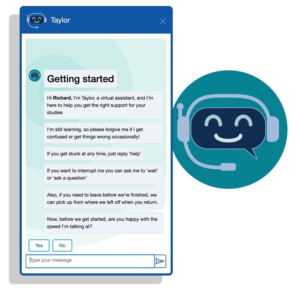The Digital Access Advisor project has been inspired in part by the research and development to create ‘Taylor’, a virtual assistant that supports Open University students to disclose disabilities and learn more about study and support. Taylor began as an alternative to the existing ‘Disability Support Form’ that students were requested to complete, but the features and ideas moved beyond this.

Taylor has been trialled with students, progressively become more embedded into the actual disclosure process, and made available to students as they disclose. Through this, we’ve gained a lot of encouraging feedback, alongside plenty of ideas for improvement (which are absolutely welcome – this is research after all, and it is early days for these systems).
We’ve learnt a lot through this work, but also recognised wider opportunities and implications to explore further. Here are some key points we want to build on, with references to further reading:
- A majority of students preferred using Taylor to disclose disabilities when compared to the existing form-based process
- But they wanted more from it. In particular, respondents prioritised getting personalised suggestions that were relevant to them, being able to use the conversation to complete other forms and processes, and better answers to their questions.
see: Iniesto et al. (2023), Creating ‘a simple conversation’: Designing a conversational user interface to improve the experience of accessing support for study.
- Administrative burden is a priority issue for disabled students across higher education. The Open University operates at a bigger scale than most, and has some differences, but the issues are wider, and so is the need for change.
see: Disabled Students UK, (2022), Going Back is Not a Choice; Policy Connect and Higher Education Commission (2020), Arriving at Thriving; and Coughlan, T., & Lister, K. (2018). The accessibility of administrative processes: Assessing the impacts on students in higher education
- Virtual assistants and other conversational user interfaces are fundamentally different by design from most other systems. Processes and guidelines to make them accessible, and to design them to manage complex, important conversations with a diverse audience of potential users, are not yet mature. But there are possibilities for them to enhance access.
see: Lister et al (2020), Accessible Conversational User Interfaces: Considerations for design.
